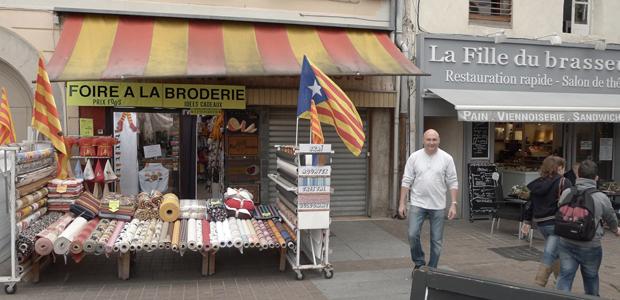French Catalans less interested in independence than Spanish neighbors
Catalan flags are a common sight in the French region of Catalonia, though there’s no serious movement toward independence. Most French Catalans feel French first. (Photo by Gerry Hadden.)
Spain’s northeast region of Catalonia held elections Sunday and the separatist parties won big — picking up nearly two-thirds of the seats in the regional parliament.
Regional president Artur Mas said if he won an electoral majority, he’d hold a referendum on independence from Spain. While Mas’ party remains the largest in the parliament, it actually lost a dozen seats and doesn’t hold an outright majority.
Mas will need partners to govern — and given the success of separatist parties — those partners will also likely support, if not insist, on a referendum on independence.
Catalans have long had their own sense of national identity, but break-away fever is at an all time high. Many Catalans feel they pay too much in taxes, and would do better economically on their own.
But Catalans don’t just live in Spain. About a half million French Catalans live in “Northern Catalonia,” across the Pyrenees in southern France.
Outside a stationary store in the regional capital, Perpignan, red and yellow striped Catalan flags flap in the breeze. You might think it’s a political statement, but the store owner, Frederique Abribas, says he also sells French flags. Abribas is a French Catalan but he doesn’t pay much attention to Spanish Catalonia’s independence drive.
“I was born here,” Abribas said, “and this region has been part of France since 1659.”
That’s when France and Spain signed the Treaty of the Pyrenees, essentially granting France the sliver of Catalan territory on its side of the mountains.
“This idea of Spanish Catalan independence isn’t new,” Abribas said. “This is a history that belongs to those on the other side of the border.”
On Spain’s side, excitement over Sunday’s vote is palpable. Spanish Catalans feel they’ve never been closer to independence. Recently, nearly two million people marched in favor of it in the streets of Barcelona.
But French Catalans are largely indifferent, in large part, because they feel French. Catalan, too, but mainly French. Key to that has been language. In Spain, Catalans have defended their language for centuries. Since the 1970s Catalan has been the language in public schools.
In France, only about 1 in 5 people use Catalan daily and even fewer can read it and write it, says Jaume Pol, Perpignan’s Catalan Affairs counselor.
“We have lost the Catalan language,” Pol said. “There is only one official language in France, and that is French, period.”
After the French revolution in the late 18th century, the state set out to put a public school in every village. Teachers were referred to as soldiers of the republic, with a mission to build a cohesive French identity.
It worked.
That, coupled with France’s relative prosperity, has made it highly unlike that a Catalan independence movement would ever take root here.
That’s not to say French Catalans aren’t proud of their culture and language. Last spring, some 7,000 French Catalans gathered on this same square. They made a video which takes you on a sort of staged stroll through French Catalan history and culture. The lyrics are all about the love of Catalan.
For most Catalans here, preserving the language, and staying French isn’t a contradiction. But not all.
On a recent afternoon the leaders of Els Amics de Catalunya, or Friends of Catalonia, held a meeting. Some took a bus to Barcelona to witness Sunday’s historic vote. Others, like Jordi Vera, a city councilor in Perpignan, are trying to convince fellow French Catalans that an independent Catalan state next door would be great news here.
“If Spanish Catalonia is independent,” Vera said, “it would have more economic resources. That means more money for cultural exchanges across our border, but also for our economy. There’d be a new synergy that’s never existed before.”
Friends of Catalonia only has a few dozen members, but the group’s ultimate aim is to see a Catalan state that includes all Catalan people, including them.
Dreaming that dream, though, can be frustrating, according to local artist Eric Forcada. He and some colleagues have formed a collective called Mirmanda. Their goal, as governments, politicians and activists squabble over borders, is to transcend them altogether.
They urge Catalan artists everywhere to join together, no matter how Spanish Catalonia voted on Sunday.
